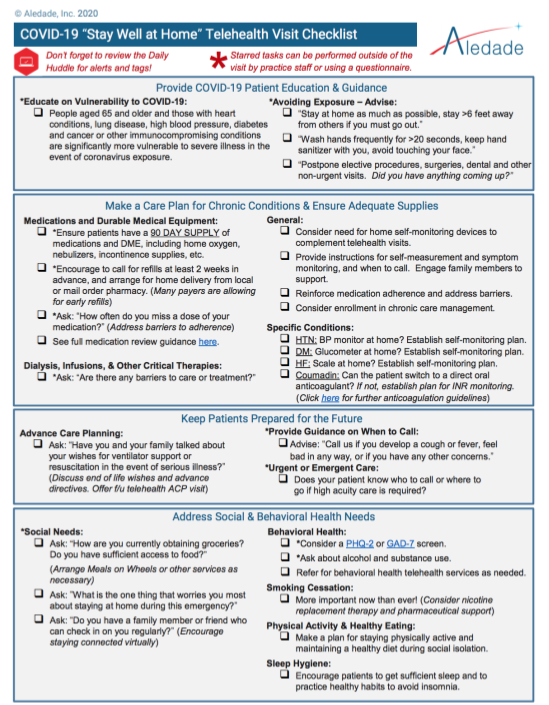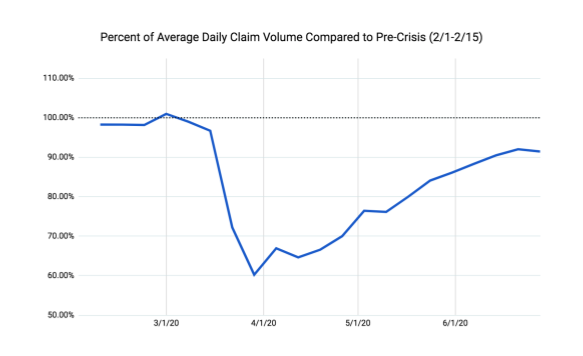As the COVID-19 global pandemic began to affect the United States in the spring of 2020, primary care practices started to experience huge drop-offs in patient visit volumes. Statewide stay-at-home orders and social distancing concerns kept patients away from the clinic, preventing many vulnerable individuals from receiving the care they needed to manage their chronic conditions.
In addition to interrupting routine patient-provider relationships, the pandemic introduced another element of concern for primary care providers: identifying individuals at elevated risk of poor outcomes from COVID-19 and educating patients about how to stay healthy during the public health emergency.
Aledade’s analytics and clinical innovation experts worked quickly to develop a COVID-19 vulnerability algorithm to support Aledade’s accountable care organization (ACO) partners. The algorithm leverages a variety of data sources to identify patients who would be at the highest risk of severe illness or death in the event of contracting COVID-19.
Primary care providers can use a prioritized list of high-vulnerability patients to conduct outreach and help their patients stay well at home. In parallel, the practices would receive detailed guidance on how to conduct these interactions successfully through practice workflow support resources like the Stay Well at Home Toolkit and access to a telehealth platform.
Within one month of the worklist and toolkit release, Aledade’s partner practices reached 67,955 vulnerable patients. One hundred and eleven practices had reached more than 50% of the patients on their respective worklists.
Using the earliest available literature describing outcomes of COVID-19 cases in Wuhan, China, the COVID-19 Vulnerability Model assigns points for specific patient demographic factors, chronic condition diagnoses, clinical severity indicators ascertained from Medicare claims, practice billing data, practice EHR data, and laboratory results obtained from LabCorp® or Quest®.
Each individual receives a score in one of four categories: average, increased, high, or very high risk.
The assigned COVID-19 Vulnerability Score is displayed prominently in the Aledade App point of care module, called the “Daily Huddle”, which enables practices to see when vulnerable patients are scheduled to come into the office.
For patients with higher vulnerability scores, providers may wish to convert the visit to a telehealth consult, reducing the risk of unnecessary patient exposure. The App also provides an outreach worklist of patients in descending order of COVID-19 Vulnerability Score to facilitate proactive outreach to patients whose vulnerability is considered to be high or very high.
How to Conduct a “Stay Well at Home” Visit
To accompany the release of the COVID-19 Vulnerability Worklist, a cross-disciplinary clinical team designed a framework for the “Stay Well at Home” (SW@H) visit. The visit framework included four elements based on the health challenges patients are facing during the pandemic.
The four elements are:
- Providing patient education and guidance for COVID-19 prevention
- Creating and executing care plans for patients who have been diagnosed with common chronic conditions (e.g., heart failure) to ensure they have adequate supplies of medications and durable medical equipment (DME)
- Conducting advance care planning, if a plan was not previously put in place
- Assessing and addressing social and behavioral needs
Aledade created a SW@H toolkit to support practices as they interact with patients in new ways. This toolkit includes descriptions of the COVID-19 Vulnerability Score criteria, including the clinical practice interpretation into categories of vulnerability risk. It also provides guidance on conducting a virtual visit and dives deeply into how to complete each of the four major elements.
 Aledade has made a concerted effort to ensure that its partner practices are aware of these resources and are able to leverage them in a meaningful way. Experts hosted webinars and discussions for primary care leadership, participated in board meetings, and conducted one-on-one practice calls to provide implementation support and hands-on guidance for clinics.
Aledade has made a concerted effort to ensure that its partner practices are aware of these resources and are able to leverage them in a meaningful way. Experts hosted webinars and discussions for primary care leadership, participated in board meetings, and conducted one-on-one practice calls to provide implementation support and hands-on guidance for clinics.
The SW@H Initiative has not only helped ensure that higher-risk patients can continue to experience continuity of care during the pandemic, but it has also offered these independent practices a means of maintaining vital visit revenue during a time when volumes were down by 20% on average and up to 40% in some areas of the country. Independent, physician-owned primary care offices provide critical access to healthcare for millions of Americans who might otherwise turn to the emergency department or urgent care centers for their basic needs.

Footnote for Graph: This graph depicts the percent of average daily claim volume over time compared to the first fifteen days in February, before the COVID-19 pandemic officially began. At the 100% line, the two-week average daily claim volume is equal to that of February 1-February 15. During the month of March, there was a sharp decrease in the percent of average daily claim volume compared to the beginning of February. This metric began to increase at the beginning of April, around the time of the Stay Well at Home Initiative launch and adjustment to telehealth visits.
According to Dr. Gary Birdsall, a solo Aledade practitioner in Cut Off, Louisiana, the COVID-19 Vulnerability Score and Worklist have helped keep his community healthy during a very trying time. “I’m getting a lot of ‘thank you’s’ for being available,” he said. “It humbles me that my patients are showing gratitude for my care. If I had gotten COVID and had to close the office, I know that there would have been lives lost. By being open during the crisis, we made many life-saving diagnoses.”
A track record of experience delivering value-based care undoubtedly primed Aledade’s ACO partners for success with reaching out to vulnerable patients during this challenging year. Familiarity with population health management, chronic care management, and strategies for reducing unnecessary acute care utilization made it easier to rapidly adopt the “Stay Well at Home” initiative.
Aledade is committed to providing resources for independent primary care practices that act as a vital lifeline for their communities and will continue to offer comprehensive support and guidance throughout the remainder of this public health event.



